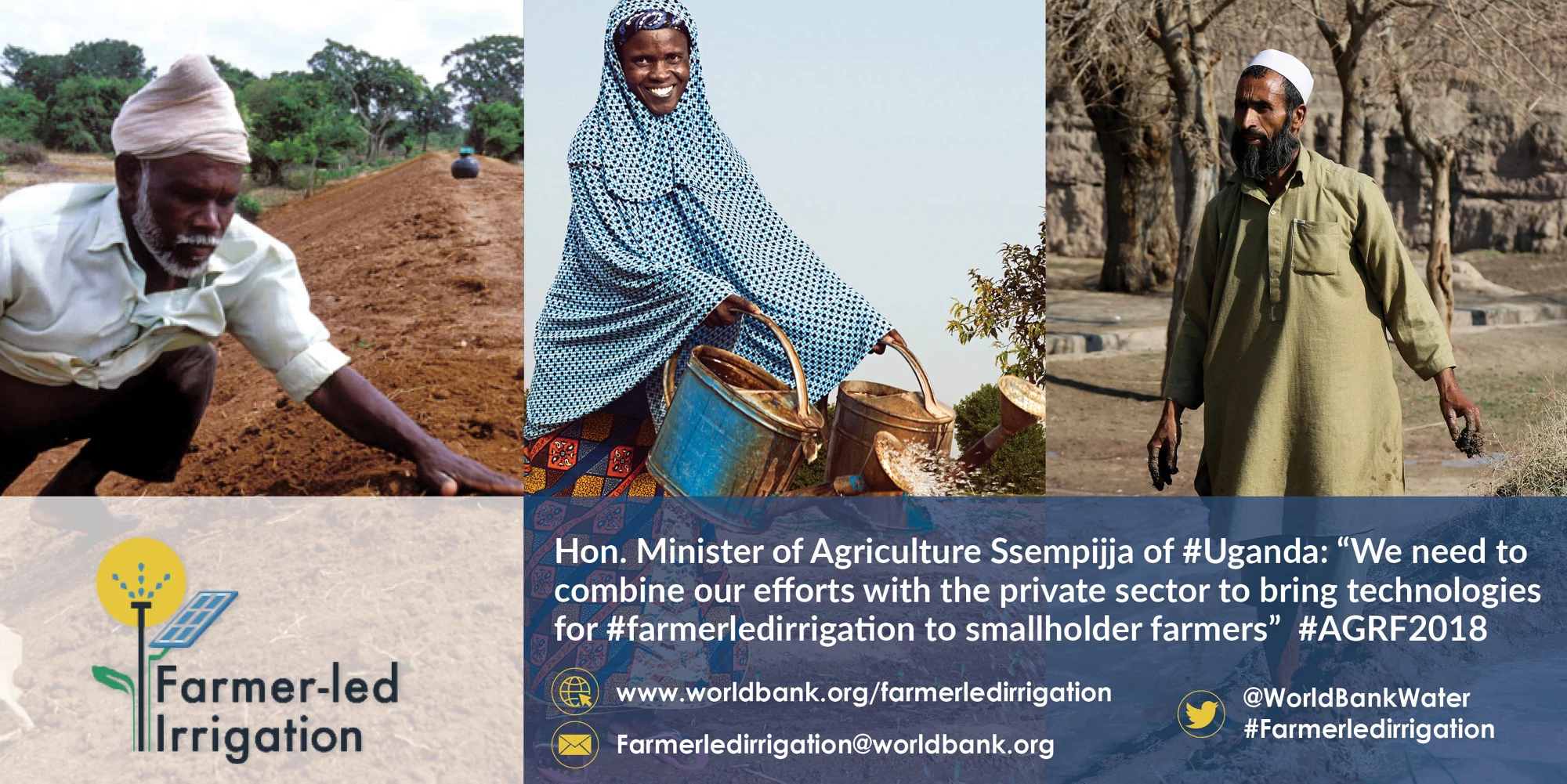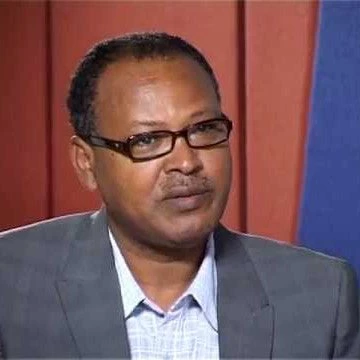Millions of small-scale farmers face significant challenges, including food and water insecurity, dependence on unpredictable rain, and increasing frequency of natural disasters. While a lot of progress has been made on sustainable agriculture, there is much work yet to be done to meet rising food and water demands in a resource finite world – in addition to improving the lives of small-scale farmers. Farmer-led irrigation offers opportunities for inclusive, sustainable, and positive change. However, urgent international commitment to and investments in farmer-led irrigation are required to tackle the water and food challenges of our time.

To this end, political leaders, financiers, policy makers, private sector representatives, academics, and entrepreneurs came together during the flagship side event on farmer-led irrigation at the 2018 Africa Green Revolution Forum (AGRF) in Kigali, Rwanda. The major side event, jointly organized by the World Bank, The Alliance for a Green Revolution in Africa (AGRA), the International Finance Corporation (IFC), and the African Development Bank (AfDB), was held on 5 September 2018 with the aim of building stronger government, private sector, and broader African stakeholder support for farmer-led irrigation. The side event follows from the 2017 Water for Food International Forum held in Washington, DC.
“Water does not respect sectoral boundaries. We must work across countries and across boundaries. As business people, farmers cannot wait for water to flow to them – farmer-led irrigation is an active management process,” said Richard Colback, Agribusiness Water Specialist at the International Finance Corporation.
The event brought together over 200 attendees, including ministers from Rwanda, Zambia, South Sudan, Uganda, and Tanzania. The World Bank delegation was led by Simeon Ehui, Director of Agriculture Global Practice. The event called on African national governments to commit to supporting farmer-led irrigation, which is based on building inclusive private sector supply chains, boosting technological innovations, and increasing use of pumps and water application. The farmer-led irrigation approach emphasizes that the government should support the development of inclusive private sector supply chains to facilitate the development of the growth of farmer-led irrigation.
“We need to combine our efforts with the private sector to bring technologies for farmer-led irrigation to smallholder farmers,” said Vincent Bamulangaki Ssempijja, the agriculture minister of Uganda.
Charles Tizeba, the agriculture minister of Tanzania, highlighted the critical importance of supporting inclusive and affordable technologies to catalyze adoption of farmer-led irrigation for sustainable land and water use. Technology is a key driver to reducing costs and quality of solar panels, submersible pumps, and low-cost sprinkler and drip irrigation systems – enabling farmers to purchase or lease-to-own solar pump equipment at a reasonable price and to irrigate larger areas in much shorter timeframes. “Crops have enough rain, but not enough water,” said Professor Nuhu Hatibu, AGRA Regional Head (Tanzania, Uganda, and Rwanda).
Importantly, farmers and farming organizations contributed to the farmer-led irrigation discussions. HoReCo (the Horticulture in Reality Cooperative) is a youth cooperative in Rwanda focused on the promotion of horticulture production. HoReCo discussed opportunities to develop training programs for farmers in Rwanda to scale up the rapid uptake of farmer-led irrigation.
2018 Kigali Joint Statement adopted by high-level officials
The primary outcome of the event was the reading and adoption of the 2018 Kigali Joint Statement on inclusive and sustainable farmer-led irrigation. The Joint Statement was formally presented by Professor Nuhu Hatibu of AGRA to over 1000 delegates assembled at the plenary session called Building the Resilience of Agricultural Systems. Recognizing the joint commitment for critical strategies in pursuit of food security in Africa, the Joint Statement was adopted by African Heads of State, ministers, and representatives of farmer organizations, private agribusinesses, financial institutions, academics, development partners, nonprofits, and civil society. The participants agreed to fully mainstream the farmer-led irrigation agenda into the irrigation policies and strategies of African countries. The 2018 Kigali Joint Statement was also included in the language of the 2018 AGRF Presidential Summit Declaration.
The Joint Statement asserts that farmer-led irrigation will fast-track access to irrigation services for millions of farmers in order to enhance adaptation of their farming systems to climate change and climate variability. In addition, the Joint Statement declares that farmer-led irrigation will make substantive contributions to the attainment of many of the Sustainable Development Goals – particularly Goal 1: No poverty, Goal 2: Zero hunger, and Goal 3: Health. This joint statement explicitly addresses the need to:
- Catalyze private and public sector support both through finance and a supportive policy enabling environment;
- Provide appropriate incentives and risk mitigation tools to ensure inclusion of small-scale farmers and women and youth to access technology through private supply chains;
- Integrate evidence-based knowledge into farmer-led irrigation investment operations;
- Foster collective action mechanisms for sustainable management of water resources;
- Build capacity and adapt technologies to monitor the expansion of farmer-led irrigation and assess the welfare impacts and resources sustainability effects farmer-led irrigation expansion at sub-national, national, and continental levels.
The World Bank will continue to support actions to champion farmer-led irrigation as a major technology, policy, and financing option. Farmer-led irrigation is taking root as a major power for inclusive change worldwide – and at its core, for improving the lives of millions of small-scale farmers.
“My vision for farmer-led irrigation is for a farmer to irrigate her small field, grow vegetables, raise livestock, and provide a future for her family.” Rob Bertram, United States Agency for International Development.
Join the farmer-led irrigation revolution discussion at @WorldBankWater with #Farmerledirrigation.
Learn more:
An Introduction to Farmer Led Irrigation
Contact: Farmerledirrigation@worldbank.org
Webpage: www.worldbank.org/farmerledirrigation



Join the Conversation